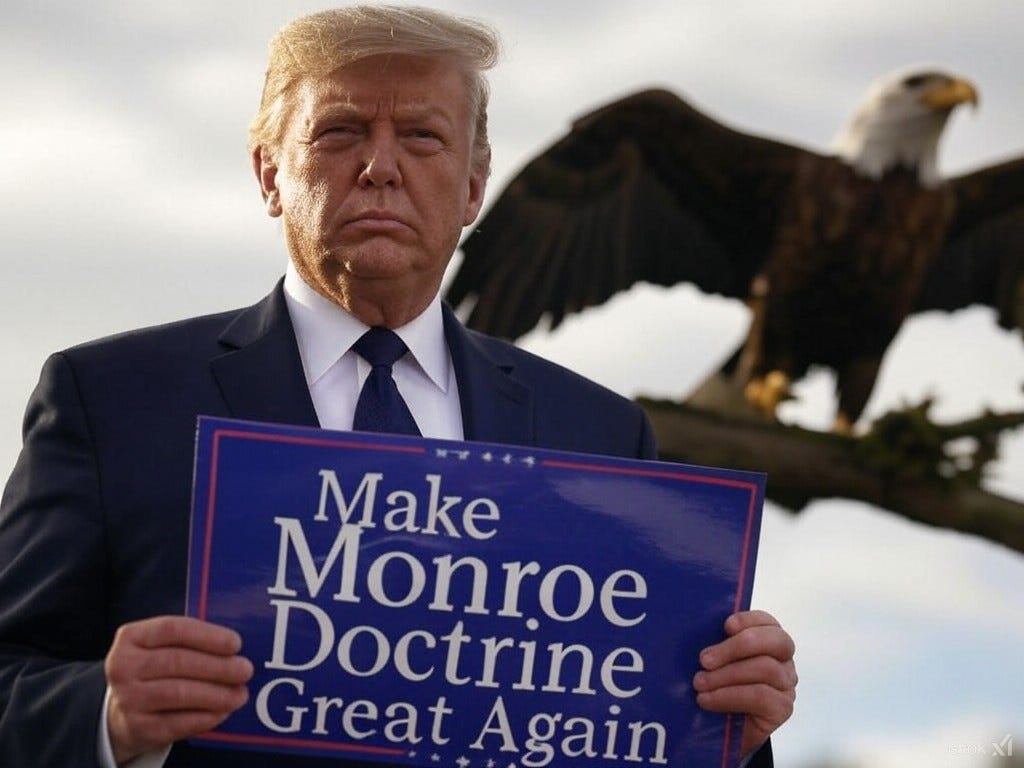Make Monroe Doctrine Great Again
A new corollary to the "America for Americans" mantra, or just fear of China?
Donald Trump has not yet taken office but has already outlined an expansionist agenda. Recently, he threatened to take control of the Panama Canal, accusing it of charging exorbitant prices for U.S. ships. The half-tycoon, half-president has also floated the idea of renaming the Gulf of Mexico to the Gulf of the United States.
In January, Trump also stated via X (formerly Twitter) his desire to annex Canada, framing the merger as a win-win solution for Canadians: lower taxes, no tariffs, and a guarantee of no Russian or Chinese ships floating around Canadian waters.
Adding to the speculation, Trump sent his son, Donald Trump Jr., on an informal visit to Greenland, expressing a willingness to purchase it from Denmark. Greenland, already home to U.S. military outposts, boasts rich natural resources and potentially vast oil reserves beneath its seabed.
The question arises naturally: what does Trump have in store? Is this an attempt to reaffirm U.S. hegemony over the Americas, or is it merely driven by fear of China’s growing commercial influence?
How the United States became a regional power in the 19th century
In 1823, during the European Restoration era and following the independence of Latin American countries from Spain, U.S. President James Monroe declared in a landmark speech that European interference in the Americas would not be tolerated. This "Monroe Doctrine" positioned the United States as the guardian of the American continent.
In 1845, journalist John L. O’Sullivan published an essay titled Annexation, advocating for the addition of Texas to the United States. He argued that the Union was destined to expand westward under a "Manifest Destiny" to spread liberty, democracy, and American values.
By 1898, the U.S. had become more assertive on the global stage. After years of unrest in Cuba, the explosion of the USS Maine became the casus belli for war with Spain. The United States invaded and annexed Puerto Rico and defeated Spain in Cuba, effectively ending Spanish colonial presence in the Americas.
In 1904, President Theodore Roosevelt expanded the Monroe Doctrine with the Roosevelt Corollary, calling for the creation of an "International Police Power" to address the insolvency of so-called "backward nations." This was partly in response to European threats to intervene militarily in Venezuela over unpaid debts.
The Strategic Importance of Greenland
Trump drew international attention to Greenland by expressing interest in acquiring it, citing national security concerns. Greenland is already home to the Thule Air Base, a critical site for missile defense systems and advanced radar for the North American Aerospace Defense Command (NORAD).
Beyond its military significance, Greenland has an estimated 2.5 million metric tons of rare earth reserves, as well as deposits of iron, gold, copper, uranium, and zinc. Geologists also estimate that the Arctic region could hold 90 billion barrels of oil, 669 trillion cubic feet of natural gas, and 44 billion barrels of natural gas liquids.
Both Russia and China have increased their presence in the Arctic, engaging in fishing and other activities. The melting of glaciers has opened new commercial routes, intensifying the geopolitical competition among these nations and the U.S.
Denmark’s Foreign Minister Lars Løkke Rasmussen has expressed openness to working with the U.S., emphasizing the need to counter China and Russia in the Arctic. Meanwhile, Greenland's Prime Minister, Múte Bourup Egede, has indicated a willingness to discuss the matter with the U.S., while asserting Greenland's aspiration for full independence from Denmark.
The Chinese Presence in Latin America
China’s influence is not limited to the Arctic. In Latin America, Chinese investments have surged, with projects including mines, oil extraction facilities, canals, harbors, and infrastructure.
Beijing has signed cooperation agreements with Cuba, strengthened ties with Venezuela, and financed dam construction in Argentina. In Brazil, significant investments have been funneled into the national oil company, Petrobras.
One of the most striking examples is the construction of the Nicaragua Canal, a Chinese-backed project intended to rival the U.S.-controlled Panama Canal.
China's growing presence in the Americas is bolstered by its membership in BRICS (alongside Brazil), paving the way for a robust anti-U.S. commercial partnership in the region.
The intensification of Chinese activities in the Americas is a continuation of the trade tensions between China and the United States that began during Trump’s first administration. These hostilities, which escalated in March 2018 with the U.S. imposing 25% tariffs on Chinese goods, were framed as a response to alleged Chinese intellectual property theft and forced technology transfers.
By January 2020, on the eve of the COVID-19 outbreak, the U.S. removed China from its blacklist of currency manipulators and signed a trade agreement to de-escalate the economic conflict.
In a world more and more multipolar, the Americas, for their juicy commodities, are becoming the new focal point of a new geopolitical chessboard, between Trump ambitions and China gaining momentum, the future of the region remains uncertain.






Well written. Thank you.
Very interesting, thanks for sharing!